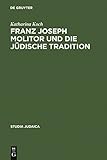Franz Joseph Molitor und die jüdische Tradition : Studien zu den kabbalistischen Quellen der "Philosophie der Geschichte". Mit einem Anhang unveröffentlichter Briefe von F. von Baader, E.J. Hirschfeld, F.J. Molitor und F.W.J. Schelling / Katharina Koch.
Material type: TextSeries: Studia Judaica : Forschungen zur Wissenschaft des Judentums ; 33Publisher: Berlin ; Boston : De Gruyter, [2012]Copyright date: ©2006Description: 1 online resource (379 p.)Content type:
TextSeries: Studia Judaica : Forschungen zur Wissenschaft des Judentums ; 33Publisher: Berlin ; Boston : De Gruyter, [2012]Copyright date: ©2006Description: 1 online resource (379 p.)Content type: - 9783110188929
- 9783110925173
- 296.1/6 22
- BM526 .K68 2006eb
- online - DeGruyter
- Issued also in print.
| Item type | Current library | Call number | URL | Status | Notes | Barcode | |
|---|---|---|---|---|---|---|---|
 eBook
eBook
|
Biblioteca "Angelicum" Pont. Univ. S.Tommaso d'Aquino Nuvola online | online - DeGruyter (Browse shelf(Opens below)) | Online access | Not for loan (Accesso limitato) | Accesso per gli utenti autorizzati / Access for authorized users | (dgr)9783110925173 |
Dissertation Freie Universität Berlin 2005.
i-vi -- Inhaltsverzeichnis -- 1. Einleitung -- 2. Biographie -- 3. Die Interpretation der Kabbala in der Philosophie der Geschichte -- 4. Die kabbalistischen Quellen der Philosophie der Geschichte -- 5. Ausblick -- Nachwort -- Anhang -- Quellen -- Literaturverzeichnis -- Zeittafel -- Namensregister
restricted access online access with authorization star
http://purl.org/coar/access_right/c_16ec
Leben und Werk des Frankfurter Philosophen und christlichen Kabbalisten F. J. Molitor (1779-1860) werden vor dem Hintergrund seiner Auseinandersetzung mit dem Judentum hier zum ersten Mal systematisch entfaltet.
This is the first systematic presentation of the life and work of the Frankfurt-based philosopher and Christian cabbalist F.J. Molitor (1779-1860) against the background of his dealings with Judaism. Molitor represented the utopia of the Christian cabbala, which sees the oldest evidence of divine revelation in Jewish esotericism. His occupation with Jewish literature over a period of more than 40 years led to his being admired by the great intellectuals of his time, but also resulted in his poverty and social isolation. This study restores a hitherto largely neglected thinker to his rightful place in German intellectual history in the first half of the 19th century.
Issued also in print.
Mode of access: Internet via World Wide Web.
In German.
Description based on online resource; title from PDF title page (publisher's Web site, viewed 28. Feb 2023)


